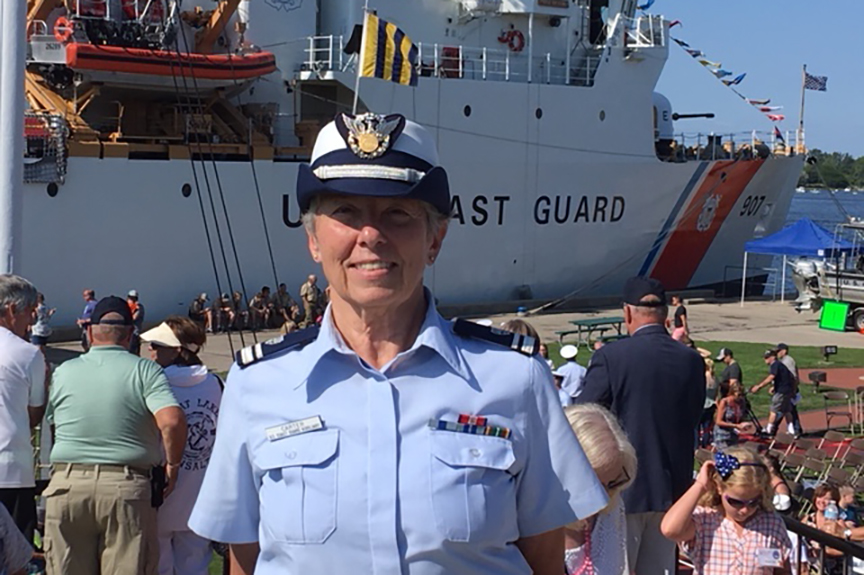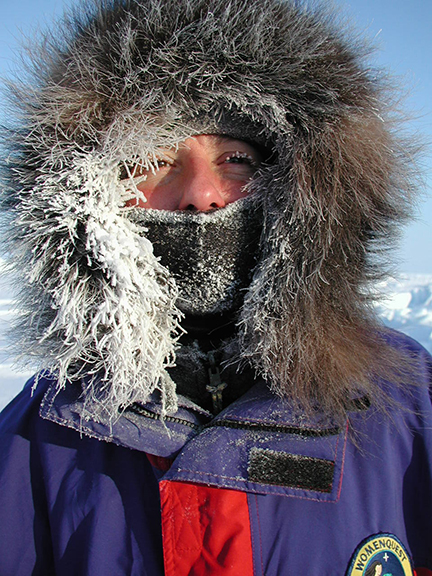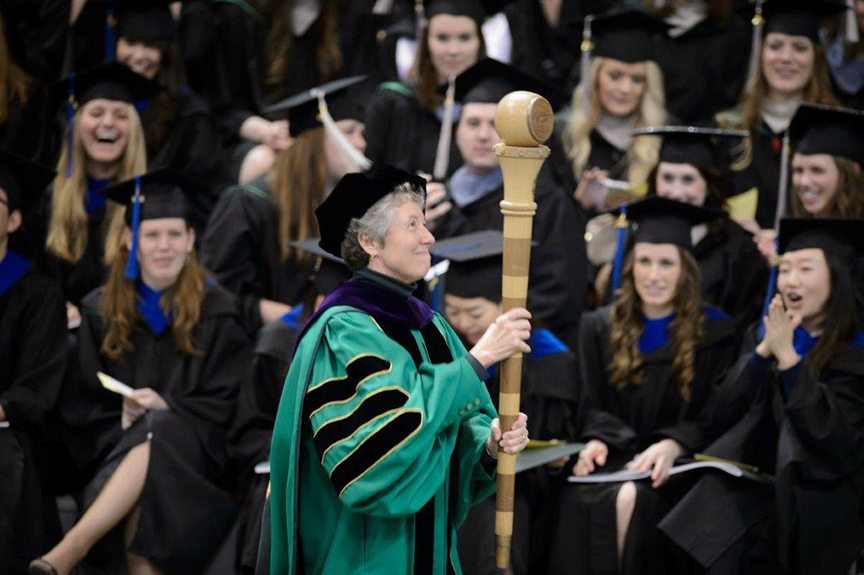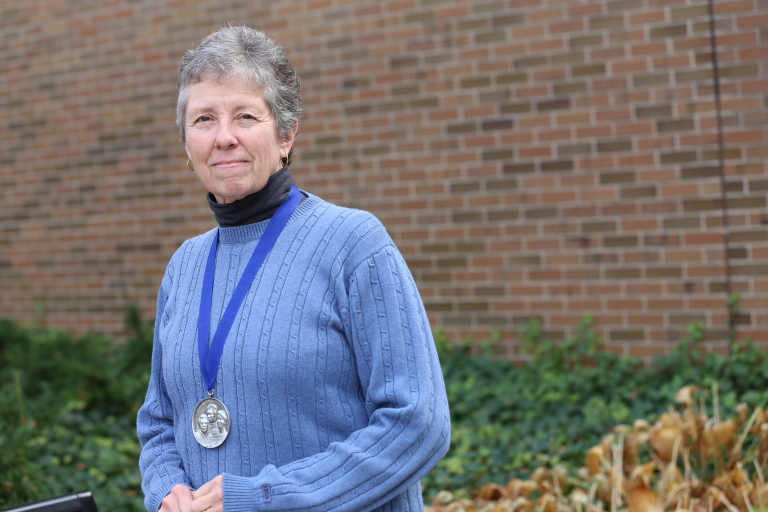Journalism Professor Served Many Roles at Michigan State University, Passing Wisdom on to New Generations
“A deep faith. A wide range of curiosity. And a sense of service.”
For Professor Sue Carter, an accomplished journalist and minister, a career devoted to elevating others comes down to these three traits.
After 28 years on the faculty, Carter retired from the MSU School of Journalism in December. True to her spirit of adventure and her goal to serve others, she began her retirement by accepting a role as an Auxiliary Chaplain for the U.S. Coast Guard.
Among her many pursuits, Carter led the first all-woman ski team to the North Pole, served as commander of her flotilla in the U.S. Coast Guard, and produced documentary films on climate change and human organ trafficking in Bangladesh. In a leadership capacity, she also worked as the press secretary to Michigan Gov. James Blanchard, served as the NCAA faculty representative for the Big Ten, worked as the Executive Assistant for two MSU presidents, and led services as both a rector and associate rector for the Episcopal Church.
Carter may be leaving behind her teaching in journalism, sports media and constitutional law, but her departure from MSU is more akin to a Change-of-Watch, opening the door to new professors and welcoming new opportunities in her storied life and career.
“Sue Carter’s collegial, supportive and caring academic and administrative contributions to journalism and MSU are hard to match,” said Associate Professor Manuel Chavez. “When we faced challenges, of any kind, she would come always to support her colleagues and the right causes. Students, staff and her faculty colleagues will be always thankful for Sue being just Sue!”

In Service of Others
For the last ten years, Carter has served in her parish, ministering in the Episcopal Church. “I think part of aging, hopefully, is wisdom, and part of wisdom is understanding the role of faith in one’s life,” said Carter. “With my new appointment, I now have a shift in my responsibilities to chaplaincy.”
Carter will support the active duty chaplain, serving eastern and lower Michigan, and her services will also be available to the chaplain based in Milwaukee, Wisc., who oversees a portion of Lake Michigan. As a chaplain, Carter’s duties may include offering counseling, holding services, leading baptisms, and facilitating the Change in Watch.
“A service that is important in the military is called Change-of-Watch, or Change-of-Command,” said Carter. “It’s when the leader—or commander, or captain, whoever it might be—moves, and the new one comes in, and there’s a service to usher in the change. One person routinely involved is the chaplain.”
The service, one which Carter will now perform, includes an oath of office, an introduction to the new command, an invocation, and often a celebration. Carter is excited to lead these services, and she’s pleased this will give her a chance to build on her experience in the Coast Guard.
Already, she is active in the U.S. Coast Guard, where she teaches boating safety courses, conducts vessel exams, and makes program visits to marine dealers, in order to better educate the boating public. She also assists with search and rescue, using her skills on the water, on the snowy slopes, and even in the air, as a licensed pilot.
“As Gandhi said, the way to find yourself is to lose yourself in service to others,” said Carter. “That applies to teaching as well. When you think of being in service to students—and also to our own particular disciplines—we are giving and giving of ourselves, and it hopefully advances either knowledge or the careers of young people.”
The Strength of Communications and Relationships
While Carter’s experience is widely varied, she finds a common link in all of her work, whether it relates to journalism, law, church, the military, or high adventure.
“The skills are two-fold: One is communication, and the other is relationships,” said Carter. “You can look at any of those particular roles, and if they’re well done, they have good communication and good relationships.”
Before becoming a professor, Carter worked for 17 years as a news broadcaster and talk show host at radio and television stations in Michigan, Connecticut, and Ontario, Canada.
“It was marvelous. I got to interview some of the luminaries of the times, in the 70s and 80s and on into the early 90s,” said Carter. “What a gift, to be able to meet just an extraordinary number of people, or to cover them as a reporter!”

During her time at MSU, she produced and directed several documentary films, while volunteering in the winter months on the National Ski Patrol. She also authored a book titled Ordinary Women: An Artic Journey, the story of her ground-breaking 2001 Polar Trek with 12 women, which led her to contribute science and math lessons to the Michigan Curriculum Famework for middle school students.
For her work, Carter has won three regional Emmy Awards, and she was inducted into the Michigan Journalism Hall of Fame in 2007 and the Michigan Women’s Hall of Fame in 2015. A huge advocate of physical fitness and sports, she also received the National Sports Broadcasting Award from United Press International.
“I think the realization for many of us is that being a reporter is not always a long-term career. To sustain that energy level to a high degree is a challenge,” said Carter. “I realized that education is always the best ticket to controlling one’s future.”

Teaching at a Nexus of Law and Journalism
First a Spartan graduating with a B.A. in Humanities, Carter now holds a Master’s in Divinity from Seabury Western Seminary and a J.D. from Wayne State University. She is also enrolled as a doctoral student at MSU, working toward a Ph.D. in History. What speaks to Carter the most, from an academic perspective, is found in the U.S. Constitution.
“There’s a real nexus between law and journalism,” said Carter. “Coming from journalism, I found constitutional rights—and certainly the First Amendment—to be a real passion.”
In her courses, Carter has covered the basics of media law—from libel, slander, and the Freedom of Information Act, to Federal Communications Commission (FCC) statutes and regulations. She has also focused on the Bill of Rights and advanced Constitutional Law, particularly personal freedoms.
“I’ve taught about 4,000 students here at Michigan State, from wide-eyed first-year students who are walking around campus with a map, to doctoral students who are agonizing over that last paragraph for their dissertation,” said Carter. “I’ve been blessed to pass on my intellectual DNA to the next generation, and the generation beyond that.”
Carter has also led dozens of study abroad programs, helping students to discover new cultures and customs across the ocean.
“That’s always been a joy to introduce students to the world beyond the borders of our own country, and have them experience that,” she said. “I love seeing it through their eyes, because I get to see it for the first time every year.”
For some students, Carter taught both the parent and their child, meeting students whose parents had studied journalism in her classes decades before. While Carter is bound to go forward and accomplish many more feats in her lifetime, she holds her time in the classroom dear.
“I remember what Christa McAuliffe, the teacher-astronaut said. She wrote ‘I teach, and I touch the future,’” said Carter. “That’s a fabulous legacy for any of us to have.”
By Melissa Priebe
